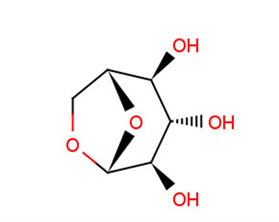
16-anhydro-b-D-Glucose
CAS No. 498-07-7
16-anhydro-b-D-Glucose ( Levoglucosan )
产品货号. M19975 CAS No. 498-07-7
1,6-脱水-bD-葡萄糖(左旋葡聚糖)是一种脱水己糖,是 β-D-吡喃葡萄糖的 1,6-脱水衍生物。它是由淀粉和纤维素等碳水化合物热解形成的。左旋葡聚糖还可用于合成手性聚合物,例如不可水解的葡萄糖聚合物。
纯度: >98% (HPLC)
 COA
COA
 Datasheet
Datasheet
 HNMR
HNMR
 HPLC
HPLC
 MSDS
MSDS
 Handing Instructions
Handing Instructions
| 规格 | 价格/人民币 | 库存 | 数量 |
| 500MG | ¥446 | 有现货 |


|
| 1G | 获取报价 | 有现货 |


|
生物学信息
-
产品名称16-anhydro-b-D-Glucose
-
注意事项本公司产品仅用于科研实验,不得用于人体或动物的临床与诊断
-
产品简述1,6-脱水-bD-葡萄糖(左旋葡聚糖)是一种脱水己糖,是 β-D-吡喃葡萄糖的 1,6-脱水衍生物。它是由淀粉和纤维素等碳水化合物热解形成的。左旋葡聚糖还可用于合成手性聚合物,例如不可水解的葡萄糖聚合物。
-
产品描述16-anhydro-b-D-Glucose (Levoglucosan) is an anhydrohexose that is the 16-anhydro-derivative of beta-D-glucopyranose. It is formed from the pyrolysis of carbohydrates such as starch and cellulose. Levoglucosan can also be utilized in the synthesis of chiral polymers such as unhydrolysable glucose polymers. Levoglucosan is also produced via caramelization of sugar. Consumption of caramel or caramel-containing sweets can lead to a short-term 5X increase in urinary levels of levoglucosan (from 20 uM/mM creatinine to 100 uM/mM creatinine).
-
体外实验Monosaccharide anhydrides, such as levoglucosan (1,6-anhydro-β-D-glucopyranoside; LG), mannosan, and galactosan, are generated from the burning of cellulose and hemicellulose.
-
体内实验——
-
同义词Levoglucosan
-
通路Others
-
靶点Other Targets
-
受体Others
-
研究领域——
-
适应症——
化学信息
-
CAS Number498-07-7
-
分子量162.14
-
分子式C6H10O5
-
纯度>98% (HPLC)
-
溶解度DMSO:10 mM
-
SMILESO[C@@H]1[C@H]2CO[C@H](O2)[C@H](O)[C@H]1O
-
化学全称——
运输与储存
-
储存条件(-20℃)
-
运输条件With Ice Pack
-
稳定性≥ 2 years
参考文献
1.Migliaccio CT et al. Urinary levoglucosan as a biomarker of wood smoke exposure: observations in a mouse model and in children. Environ Health Perspect. 2009 Jan;117(1):74-9.



 021-51111890
021-51111890 购物车()
购物车()
 sales@molnova.cn
sales@molnova.cn











